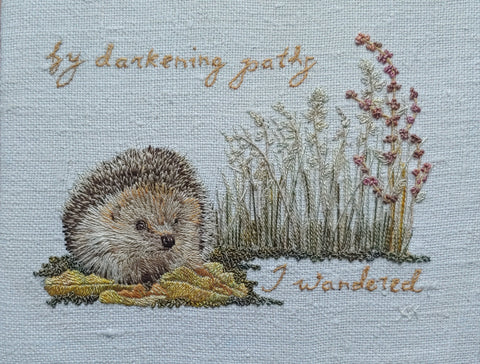“Winter, a lingering season, is a time to gather golden moments, embark upon a sentimental journey, and enjoy every idle hour.” John Boswell

Kick off your shoes. Snuggle under a thick, cosy blanket with a good book, perhaps a beloved cat or dog curled up next to you, and a cup of something warming by your side. The garden has been put to bed for the year and thoughts turn inwards to home, warmth, comfort, and evenings dreaming by the fire. Breathe, and luxuriate in the fact that winter is almost here and there is nothing to be done except to stay warm inside. I know this is an idealised view and that there is still plenty of work to be getting on with; yet that yearning, that dream of slowing down during the dark months of the year always starts to occupy my mind around this time.
In the British Isles we only have a few wildlife friends that hibernate. The most famous, thanks to Lewis Carroll, is the dormouse but hedgehogs, bats, some insects, butterflies and bees also sleep the winter away. I’ve often wondered if somewhere in our ancient past there was a time when we too hibernated. Now I've found that this might have been the case, as 400,000 year old bones belonging to early Neanderthals were found last year on an archaeological dig in Spain.* Scientists noted that the lesions on the bones were similar to those on the bones of hibernating animals and concluded that early man had survived the harsh winters of those times in the same way. This is still only a theory, but perhaps there is a hibernation gene in our DNA after all!
These days full hibernation might be a bit much, yet the onset of winter brings a desire in lots of us to create a store of harvested goods, to shut ourselves in and hunker down, to semi-hibernate, and to me that seems perfectly natural. I love that autumnal urge to make jams and preserves to enjoy in the winter months, the rituals of Stir Up Sunday and Michaelmas Fairs, all links to our ancestors and all part and parcel of the turning of the year.
I think it's more than that though and part of a more recent ancestral memory. Imagine yourself at home on a winter evening in the sixteenth century. No electric light, not even gas light. No central heating. No TV or computer. What would you do? My guess is get an early night. But did people really sleep the whole night through? Sleep a full twelve hours or more until the light returned? In her thought provoking book 'Wintering: How I Learned to Flourish When Life Became Frozen', Katherine May describes how the midnight watch used to be observed. She writes of author Roger Ekirch’s book, 'At Day’s Close: a History of Nighttime' " Waking in the midst of a long winter night is, he argues, a form of sleep that would have been entirely normal before light was at our command. Nights were divided into a first and second sleep, with a “watch” in between, during which people would pray, reflect, make love or indulge in quiet conversation with family. It was an intimate time, so private and mundane that it barely merited a mention.” **
Last winter during lockdown, when I didn’t have to go out to work, when staying at home was essential, I found myself falling into this same pattern; asleep by 9pm, waking around 1am and back to sleep at 3am. I loved it. I always woke in the morning feeling totally refreshed, but my favourite aspect of this interrupted sleep was that the hours between 1am and 3am were focussed and calm, creative ideas flooded into my mind, problems I’d wrestled with during the day seemed easy to navigate. It was a revelation, and I hope I can replicate it this year.
Time to embrace the dark months. To indulge in a spot of semi-hibernation. I have embroidery silks, linen and ideas a plenty. My husband, Rick, has made a good supply of beeswax candles to create a lovely cosy glow. Blankets, cushions and pillows are on standby. Our pantry shelves are well stocked with preserved garden and hedgerow produce. Books I've been wanting to read for many moons are waiting for me. I’m looking forward to a time of peace and reflection. To slow down. To share 'golden moments' with family and friends. To sleep. To dream.

* Early humans may have survived the harsh winters by hibernating | Neanderthals | The Guardian
** Wintering: The Power of Rest and Retreat in Difficult Times by Katherine May Published by Ebury Press ISBN: 9781846045998
'Sleeping Mouse' is an archive work whilst 'The Hedgehog' embroidery is one of my current pieces, it and Rick's beeswax candles can be found at:
The Peacock's Tale (the-peacocks-tale.co.uk)
